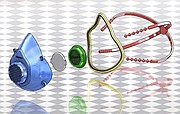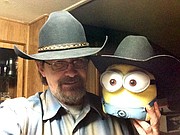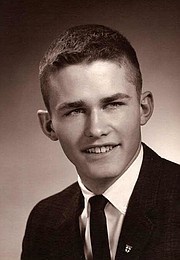Local man instrumental in combating COVID-19
BONNERS FERRY — Due to problems with obtaining n95 particulate-filtering respirator masks, community members and business owners have been finding creative ways to produce some sort of barrier masks to help in preventing the spread of the COVID-19 virus.
Whether the diminished supply is due to hoarding, or that producers are unable to keep up with demand, the n95 masks are scarce. A recent attempt to find legitimate n95 masks online proved unsuccessful with uline.com writing that they will not have the masks until June, and a number of other companies simply out of stock.
That is all going to change thanks to a Boundary County resident with a great idea.
“A couple days after I talked with Callie [of Bonners Ferry’s Callie’s Niche] and heard she and others were making masks to give to the hospital, I was contacted by a colleague, Sonnie Bocala, from Apex Labs in La Mesa Calif., about the N59 masks he’d been [3D] printing to give to San Diego area hospitals & doctors’ offices,” said Brian Hengel-Lentz.
Colleagues, Hengel-Lentz of Bonners Ferry, Idaho and Bocala, of San Diego, California, decided to do some amazing things to combat the decrease in availability of COVID-19 standard precautions.
“It was taking him [Bocala] three to four hours each to [3D] print the masks & filter retainers, but his computer-aided design (CAD) models weren’t appropriate for molding, which can produce hundreds or thousands of masks per day,” said Hengel-Lentz. “He asked that I reverse-engineer his masks to make them moldable so, using my seat of SolidWorks, that’s what I’ve been working on, off and on, for two weeks.”
Hengel-Lentz, a former engineer and CAD professional, has both the knowledge and experience to make the masks.
A 1966 Bonners Ferry High School graduate, Hengel-Lentz has been instrumental in a number of impressive engineering and manufacturing endeavors throughout his life.
“After graduating from the “old old” Bonners Ferry High School, down by the river, I wrangled horses at a small ranch in Descanso, Calif., for a few months. I was then offered a quality control position at a Electralab Electronics printed circuit manufacturing company in Encinitas, Calif.,” explained Hengel-Lentz. “I made the world’s first 12-layer multilayer boards, and it was only at final customer inspection and approval that I learned the boards were for the navigation & guidance computer for Apollo 11, so I helped put Armstrong & Aldrin on the Moon.”
Office workers throughout the world owe Hengel-Lentz a high five for his next invention.
“Around 1975, while designing hot-melt adhesive equipment at LTI in Monterey California, I developed and built the original equipment that applied pressure-sensitive adhesive to rolls of yellow paper supplied by the customer,” said Hengel-Lentz. “ I shipped that product to Scotch-3M in Minneapolis where they had the rolls cut into 3” squares and stacked into pads; the first Post-It Notes!”
Hengel-Lentz was introduced to CAD in 1984 when he entered the College of San Mateo, California, armed with an IBM personal computer loaded with AutoCAD r2 given to him by Litton Electron Devices.
“I read the manual and “played with” the software before the course started; and the night of the first class was asked to help the teacher train others during the course,” said Hengel-Lentz. “A couple of years later, Litton Electron Devices then bought me a more powerful...workstation and a very expensive seat of ProEngineer. I continued to design, and automate the design of microwave vacuum tubes for military, scientific & medical uses during which time I also authored several training syllabi and magazine articles on the use of AutoCAD and ProE, and beta-tested computer accessories for Logitech.”
In 2002, a colleague suggested that Hengel-Lentz “go independent” which led to him forming Texas CADDpro LLC in Buda, Texas. In 2003 that same colleague sent Hengel-Lentz varied jobs for design work, the first of which was the creation of parts for NASA’s Space Shuttle liquid-oxygen engine pumps.
Now, Hengel-Lentz and his colleagues at Apex Labs, are using their talents to help first responders who have found themselves without adequate protection against the COVID-19 virus.
“The molds [of the new masks] are being made by Dane Kinchen at AD Plastics in Houston Texas, and there are already more orders for these masks than can be made in a year,” said Hengel-Lentz. “I imagine many will end up in our National Stockpile and overseas, after our domestic needs have been fulfilled.”
Hengel-Lentz and his colleagues’ masks will be available in sizes ranging from small, medium to large. The masks’ assemblage consists of a filter, retainer, gasket and a strap.
“I’ve worked for almost 80 different clients in the last 17 years, and still never know what I’ll be designing next: dental appliances, earbuds, semiconductor fabrication & testing equipment, electronic test and network systems, environmental sensing components, gas pump kiosks, exercise equipment, roof racks for boats, fishing accessories, fencing & building components, automotive spray booths, water and fuel pumps, kitchen hoods, safety features for industrial trucks & fork lifts, parts for military & commercial aircraft and COVID-19 masks, right here in Bonners Ferry,” said Hengel-Lentz.
“It’s been a real blessing to me to participate in this endeavor,” said Hengel-Lentz. “Right here in Bonners Ferry!”







